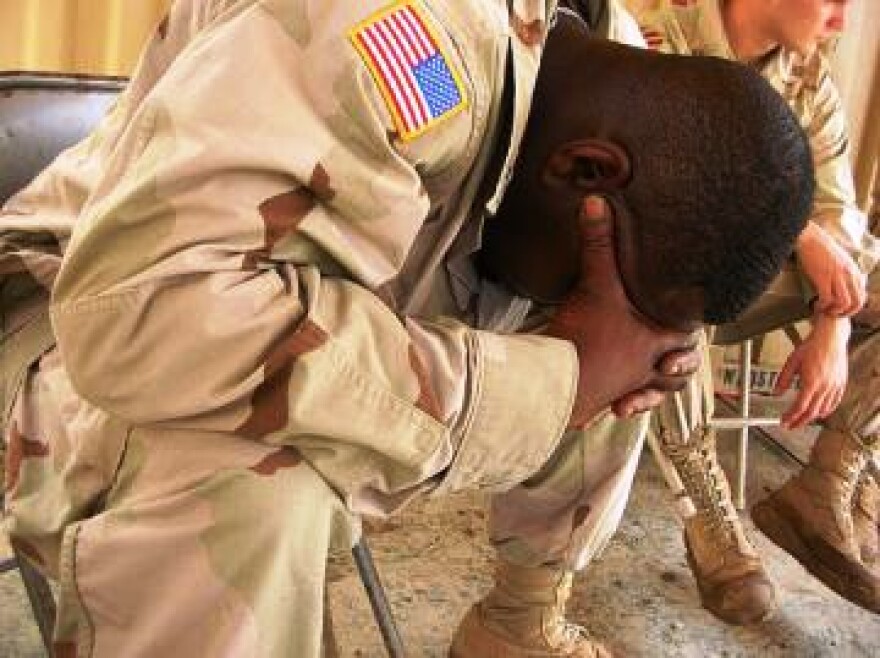Studies show that only about half of the veterans who need mental health care seek treatment. And of those who get care – many drop-out before treatment is complete.
“So, we’re only reaching a third of people ultimately who need the treatment,” said retired Army Col. Dr. Charles Hoge. He works as a civilian at Walter Reed National Military Medical Center where he used to head up PTSD research.
Hoge is familiar with approved “evidence-based” treatments for post-traumatic stress. Yet he also is open to emerging or alternative treatments.
“The bottom line with treating trauma related conditions is that one size doesn’t fit all,” Hoge said. “And to me, it’s important to offer clients a wide range of options and really work with them on what they’re most comfortable with.”
Hoge believes by offering alternative treatments such as Narrative Exposure Therapy or Accelerated Resolution Therapy (ART), more veterans to seek help.
“A lot of times what happens to veterans is they get discouraged.” Hoge said during a break at the First Annual Conference of the International Society of Accelerated Resolution Therapy (IS-ART) in Tampa, FL. “They go in, they have bad experience with the mental health care system or the medical system, and then they throw up their hands and they say I’m not going back there ever again.”
Last year, Hoge and 15 of his staff at Walter Reed were trained in ART. It’s a PTSD therapy that uses eye movement to retrain memory. It’s only had one trial and is not approved by the Veterans Administration but is slowly being accepted by the Department of Defense.
“There’s always resistance to new ideas because a lot of new ideas don’t pan out and a lot new ideas people think are the greatest thing since sliced bread and they get the funding and the research is done and they turn out to not be effective,” Hoge said.

So far, Hoge said in his presentation that ART has been as effective as other “approved” trauma therapies.
More than 30 staff members at Fort Belvoir Community Hospital in Virginia are trained in Accelerated Resolution Therapy. Dr. Wendi Waits is director for Behavioral Health at Fort Belvoir, an Army base hospital.
“And I found that ART, because it’s such an effective therapy and because it involves creativity and because patients tend to do very well with it, my providers seem happier, more excited about their work,” said Waits, a presenter at the IS-ART conference. “They’re more resilient. We laugh more in staff meetings and just in general they’re having less stress.”
The therapy also has been used with the 75th Rangers at Fort Benning according to Kevin Kip, an associate professor and executive director of the research center at the University of South Florida College of Nursing.

“And next month, it’s going out to Fort Hood.” Kip said. “So, there is at least movement somewhat within the DOD (Department of Defense) to get clinicians trained in this method.”
Supporters of alternative therapies often have an uphill battle to get research funding to prove their therapy is effective. But Kip has some hope that legislation passed in the U.S. House called the COVER Act – may offer veterans a path to alternative treatments.
“It blanketly (sic) allows veterans to seek alternative therapies and still be covered by the VA,” Kip said. “So, you could have veterans who have tried some of the existing therapies, haven’t had a really good result. Well under the COVER Act they could be treated for Accelerated Resolution Therapy.”
He says the COVER Act would also include coverage of equine therapy or service dog therapy.
The COVER Act was incorporated into a highway funding bill - HR 3236: Surface Transportation and Veterans Health Care Choice Improvement Act of 2015.
That legislation passed the U.S. House earlier this week and passed the U.S. Senate, yesterday, July 30, 2015.



